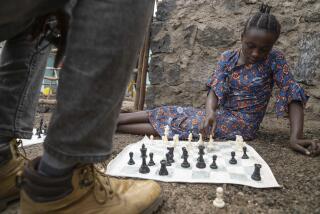PLACENTIA : Youths on the Move at Chess Camp
- Share via
As 12 boys watched intently, Calvin Olson stood in front of a chess board and made his move--using a pawn, he seized a bishop and added it to other captured pieces next to the board.
Although the room remained quiet, the boys telegraphed their admiration for the move with a raised eyebrow here, a nod there.
For Olson, however, there was little time to dwell on the admirable move because he had to quickly switch to another board to ponder his next move and his next opponent. Methodically, Olson worked his way from player to player, studying a board, making a move, moving on.
Olson, classified as a Chess Expert, and Jonathan Goetze, classified as a Chess Master, played simultaneous matches against 27 youths as the Chess for Juniors National Chess Camp got underway Friday at the Placentia Boys Club.
The chess camp runs through Sunday with workshops, tournaments and opportunities for the players to have their games analyzed by the camp’s director, highly ranked Senior Chess Master Robert M. Snyder. The 26 boys and one girl attending the camp are 6 to 15 years old.
Snyder, founder and director of the Garden Grove-based Chess for Juniors club, said the camp offers young chess players intense training in areas such as the opening move, avoiding traps and overall improvement.
But it also offers participants the chance to play frequently over the weekend, something that can prove quite a challenge for skilled young players who often lack opponents.
“Most of my friends don’t play chess,” said 10-year-old Trevor Connon. “They like to play other sports.”
That remark was echoed by many campers. “I usually play my dad or other club members,” said 11-year-old Alexander Huff. “I play about two games a week.”
The lack of opponents hasn’t hurt Alexander, who placed second in his age group at a national tournament in April. Like other top players coached by Snyder, Alexander spends several hours a week in private and group lessons, working on challenges set up by Snyder.
“The top kids take one to two hours in private lesson as well as the group lesson offered through the club,” Snyder said. “In addition, they spend a couple of hours working at home.”
Chess for Juniors members have the use of video lessons, computer chess games and books on chess to improve their game. The club also holds frequent tournaments and other activities to help players advance.
The young students are adept at understanding strategy, Snyder said. They quickly understand the importance of patience, of thinking ahead and planning their next moves, qualities that Snyder said often bolster school performance and improve critical thinking.
Eight-year-old Caroline Ratajski agreed with Snyder’s assessment. “Your brain can expand and you can get knowledge that helps you think,” Caroline said. But, she said, “Mainly it’s fun.”
After each turn, Caroline and the other students write down their move and their opponent’s move. Keeping score is necessary in tournaments and also offers students a chance to review their games.
“When you play chess, you can see the results of a bad move, you can see what happens when you aren’t patient,” Snyder said. “And these kids learn that. Sometimes the hard way, but they learn.”


